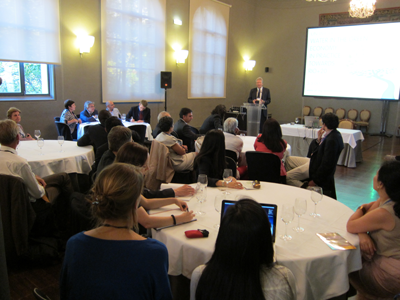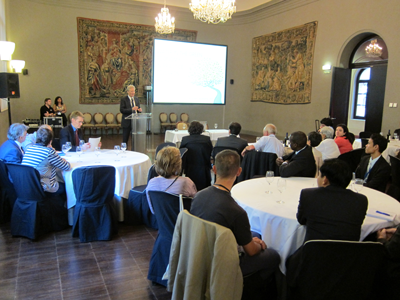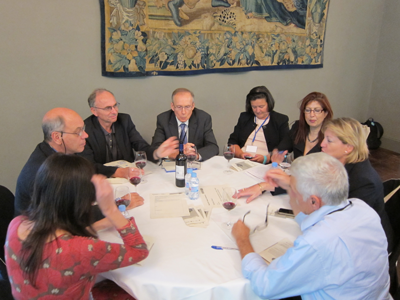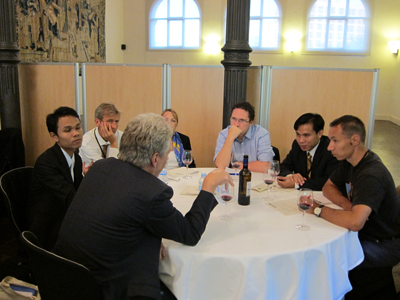- ON THE DECADE
- THE DECADE'S CAMPAIGN
- REPORTING ON PROGRESS
- THE DECADE'S PROGRAMMES
- FOCUS AREAS
-
- Access to sanitation
- Financing water
- Gender and water
- Human right to water
- Integrated Water Resources Management
- Transboundary waters
- Water and cities
- Water and energy
- Water and food security
- Water and sustainable development
- Water and the green economy
- Water cooperation
- Water quality
- Water scarcity
- FOCUS REGIONS
- RESOURCES FOR
- UN e-RESOURCES
International UN-Water Conference. Water in the Green Economy in Practice: Towards Rio+20. 3-5 October 2011
3 October 2011: From theory to practice: Ways to foster inter-sectoral coordination and planning for better addressing water, energy and food security
 On 3 October 2011, the Government of Germany ran this side event as a precursor to the Bonn2011 Conference 'The water, energy and food security nexus – solutions for the green economy'. The discussions were used to shape the preparations for the Bonn2011 Conference. The conveners presented five theses related to the water, energy and food security nexus, which were discussed by over 30 participants from different regions and UN Organisations:
On 3 October 2011, the Government of Germany ran this side event as a precursor to the Bonn2011 Conference 'The water, energy and food security nexus – solutions for the green economy'. The discussions were used to shape the preparations for the Bonn2011 Conference. The conveners presented five theses related to the water, energy and food security nexus, which were discussed by over 30 participants from different regions and UN Organisations:
- An integrated nexus-perspective on water, energy and food security requires new inter-sectoral institutions;
- Water, energy and food security are mainly endangered by bad water governance rather than by shortage of water resources;
- Sectoral incentives – namely subsidies – discourage inter-sectoral thinking and action;
- Using wastewater as a resource requires a change in values and behaviour which will take generations. As change is urgently needed, appropriate regulatory measures combined with strong enforcement are imperative;
- We do not need to worry about the availability of water resources – in the past, mankind was always able to cope with the challenges by technical innovations.
 The side event participants provided valuable feedback on these statements and the overall Bonn process. This will help to shape the Bonn2011 Recommendations from the perspective of International Organizations dealing with water issues. The detailed outcomes of the discussions are:
The side event participants provided valuable feedback on these statements and the overall Bonn process. This will help to shape the Bonn2011 Recommendations from the perspective of International Organizations dealing with water issues. The detailed outcomes of the discussions are:
Thesis 1: An integrated nexus-perspective on water, energy and food security requires new inter-sectoral institutions.
Pros: There is a need for inter-sectoral coordination of sectoral master plans.
Cons: Many institutions would consider cross-sectoral implications of their decisions if they would work properly.
Recommendations: Integrated Water Resources Management (IWRM) provides a model for integrated approaches – other sectors have to be included more intensively in IWRM-processes.
Thesis 2: Water, Energy and Food Security are mainly endangered by bad water governance rather than by shortage of water resources.
Pros: Recognition of the role of water governance; Inter-sectoral nexus perspective on challenges.
Cons: Thesis is less applicable to the energy sector. Availability of water resources is a boundary condition.
Recommendations: Given the stress on water resources (climate change, population growth), we cannot afford to have bad water governance if we want to achieve water, energy and food security for ourselves and future generations.
Thesis 3: Sectoral incentives (namely subsidies) discourage inter-sectoral thinking and action.
 Pros: There are many incentives for only one sector. Subsidies for e.g. access to energy can have negative impacts on water consumption (more water is being pumped etc.). Sometimes subsidies also have negative impacts on several sectors (e.g. cheap water leads to water wastage which is at the same time a waste of energy that is needed to treat and transport the water).
Pros: There are many incentives for only one sector. Subsidies for e.g. access to energy can have negative impacts on water consumption (more water is being pumped etc.). Sometimes subsidies also have negative impacts on several sectors (e.g. cheap water leads to water wastage which is at the same time a waste of energy that is needed to treat and transport the water).
Cons: Sectoral incentives can be structured in a participatory and multi-sectoral way.
Recommendations: Develop concepts of cross-subsidization to achieve efficiency (with benefits for other sectors) and ensure access for the poor at the same time (social pricing, rising block tariffs). We need a multi-sectoral conception of subsidies (integrated planning) to encourage research and development rather than mono-sectoral investments.
Thesis 4: Using wastewater as a resource requires a change in values and behavior which will take generations. As change is urgently needed, appropriate regulatory measures combined with strong enforcement are imperative.
Pros: Education and behavior change needs time.
Cons: Increased understanding and education is key for a behavior change. Regulatory measures can only be properly enforced by conviction. A mixture of incentives, pricing and regulation is needed to succeed. Regulation without conviction is expensive (enforcement and monitoring).
Recommendations: Wastewater reuse requires awareness raising and an increased understanding. Value local knowledge. Establish standards. Research must give scientific basis to end existing prejudices. Penalties are needed to facilitate behavior change. Invest in research. Build in more flexibility.
Thesis 5: We do not need to worry about the availability of water resources – in the past, mankind was always able to cope with the challenges by technical innovations.
 Pros: Technical innovation is necessary and important.
Pros: Technical innovation is necessary and important.
Cons: Technical innovation alone is not sufficient. No consideration of important leveraging effects (influencing consumption patterns etc.). The importance of knowledge sharing is not recognized in the thesis. The human factor is particularly important in the management of water resources – people, not technical innovations, should be in the centre of approaches to better manage water resources for the nexus.
Recommendations: Technical innovations work better when they are simple and easily understood by the users – we should always keep in mind that technology is for the people and not people for the technology. Technical innovations need to be accompanied by economical, social, political and environmental frameworks that give direction to innovations.
>> Conference Home
>> Statements from UN Agencies
>> Video recording of sessions

>> Ch1 Water on the Road to Rio+20
>> Ch2 Challenges and opportunities for water in the transition to a GE
>> Ch3 Thematic conference papers
>> Ch4 Conference summary: Water in the GE in practice
>> Ch5 The way forward
>> A1 Water toolbox: A contribution to Rio+20
>> A2 Feedback report
>> A3 Communications report
>> Case papers by tool
>> By region 
>> Developing countries 
>> Developed countries 
>> Agenda 
>> Economic instruments
>> Green jobs
>> Sustainable financing
>> Investments for biodiversity protection
>> Water technology
>> Water planning
>> ESCWA region
>> LAC region
>> Conference daily
>> Interviews with case presenters 
>> Presentations
>> Communications articles
>> Conference media brief 
>> Daily press notes
>> Interviews with session conveners
>> Issues information briefs
>> Tools information briefs
>> Banners
>> Reader on water and the Green Economy 
>> Conference poster 
 >> Discussion forum
>> Discussion forum
 >> Twitter
>> Twitter
>> Water, energy and food security
>> Spanish Business Dialogue
>> Stakeholder dialogue on the Green Economy in Spain
>> Technical visit
>> Organizers
>> Participants
>> Conference committee
>> Rationale
>> Tools
>> Expected outcomes
>> 2nd UNCSD PrepCom
>> Road map to Rio+20
>> Key questions on GE
Copyright | Terms of use | Privacy notice | Site Index | Fraud alert | Help





